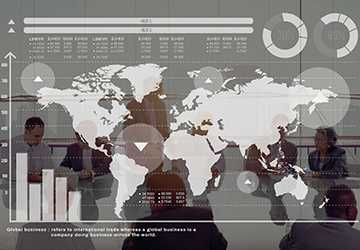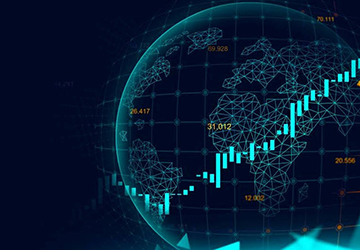The Influence of Global Events on Financial Markets
Global events significantly impact financial markets, affecting investor behaviour, market sentiment, and economic stability. Because financial markets are based on information and expectations, they naturally react to events worldwide. Unforeseen events often disrupt the status quo and create volatility as investors must quickly rethink their plans.

Financial markets are affected by various factors, including social movements, economic trends, and geopolitical events. Therefore, it is essential for investors and anyone seeking financial stability to understand the potential impact of these global events on the market. This helps investors understand market movements and gives them a complete understanding of the reasons behind the cyclical fluctuations in their investments.
Here are some of the important global events and their potential impact on financial markets:
1. Geopolitical Events
Wars and Conflicts: These often lead to increased market volatility, a flight to safe assets (e.g., gold, U.S. government bonds), and disruptions in commodity markets (especially oil and gas).
Terrorist Attacks: Similar to wars, these events can immediately lead to market sell-offs and increased uncertainty, affecting industries such as travel, shipping, insurance, and defence.
Political instability: Changes in government, coups, and political unrest can lead to general market uncertainty, affecting currency values and investor confidence.
2. Economic Events
Recessions and economic crises can lead to significant market declines, lower consumer confidence, and lower corporate profits. Examples include the 2008 financial crisis and the Eurozone debt crisis.
Monetary policy changes: Central bank actions such as interest rate changes and quantitative easing directly affect bond yields, stock prices, and currency values.
Trade policy and tariffs: Trade wars and tariffs can disrupt global supply chains and affect stock markets, especially industries that rely on international trade.
3. Natural Disasters and Epidemics
Natural disasters: Hurricanes, earthquakes, and tsunamis can cause direct economic losses and affect insurance companies, infrastructure assets, and regional economies.
Epidemics: The COVID-19 pandemic is a prime example, which has led to widespread economic shutdowns, unprecedented government stimulus, changes in consumer behaviour, and volatility in financial markets.
4. Technological Advances
Cybersecurity threats: Large-scale cyberattacks can disrupt markets, mainly when they target critical financial infrastructure or essential companies.
Innovation: Technological breakthroughs can drive growth in specific industries, such as the technology boom in the late 1990s or the rise of renewable energy technologies.
5. Environmental and Climate Events
Climate change: Increased awareness and regulatory changes related to climate change can affect investment strategies, as well as incredibly sustainable and ESG (environmental, social, governance) investing.
Environmental regulations: New policies to reduce carbon emissions can affect industries such as fossil fuels, automotive, and manufacturing.
6. Social and Cultural Shifts
Demographic changes: Aging populations in developed countries can affect pension systems, healthcare needs, and labour markets.
Social movements: Movements dedicated to social justice, equality, and environmental sustainability can influence corporate practices and investor preferences.
7. Globalization and Supply Chain Issues
Global supply chains: Disruptions caused by geopolitical tensions, epidemics, or natural disasters can disrupt international supply chains and affect production and market prices.
Trade agreements: The conclusion or termination of trade agreements can affect global trade dynamics and various sectors.
Case Studies aand Historical Events: Financial Markets and Global Events
Studying specific historical case studies can significantly enrich our understanding of the impact of global events on financial markets and the market's response to international events. These events demonstrate how interconnected our world is and how financial markets respond to various global disruptions.
2008 Financial Crisis
The financial crisis triggered by the bursting of the U.S. housing bubble in 2008 was one of the most significant economic events in modern history. The widespread use of complex financial instruments such as mortgage-backed securities and notes exacerbated it.
Impact on Markets:
Stock markets: Major indices such as the S&P 500 and the Dow Jones Industrial Average fell more than 50% from their highs.
Credit markets: The credit freeze led to a sharp increase in credit costs and reduced available credit.
Global recession: The crisis led to a worldwide recession, with the worldwide economy shrinking, unemployment soaring, and governments implementing massive stimulus packages to stabilize their economies.
COVID-19 Pandemic (2020)
The COVID-19 pandemic is a global health crisis that has led to widespread lockdowns, travel restrictions, and a sharp slowdown in economic activity.
Impact on Markets:
Stock markets: The initial reaction was a sharp drop, with major indices falling by around 30% in March 2020. However, unprecedented fiscal and monetary stimulus measures led to a rapid economic recovery.

Industries: The travel, hospitality, and retail sectors were hit hard, while the technology and healthcare sectors saw significant growth as remote work and health concerns became prevalent.
Commodity Prices: Oil prices briefly turned negative for the first time in history due to collapsing demand and oversupply.
Brexit (2016)
The Brexit vote created massive uncertainty about the future of trade, regulation and economic relations between the U.K. and the E.U.
Impact on Markets:
Currencies: The British pound fell sharply against the U.S. dollar and other major currencies, reflecting concerns about the U.K.'s economic outlook.
Stock Markets: UK-centric stocks and industries dependent on European trade experienced volatility and declines, while multinational companies with diversified revenue sources showed resilience.
Investment: Uncertainty led to declining U.K. business investment, hurting economic growth prospects.
Gulf War (1990-1991)
The Gulf War, triggered by Iraq's invasion of Kuwait, had significant geopolitical and economic impacts, particularly on oil markets.
Impact on Markets:
Oil prices: Oil prices more than doubled on the eve of the conflict, reflecting concerns about supply disruptions in the Middle East.
Equity markets: Uncertainty and the potential for a prolonged conflict led to increased volatility in global equity markets.
Commodities: Demand for safe-haven assets such as gold increased as investors sought to protect their assets from geopolitical risks.
Japan Tsunami and Fukushima Disaster (2011)
The 2011 earthquake and tsunami in Japan led to a nuclear disaster at the Fukushima Daiichi nuclear power plant, causing widespread damage and economic dislocation.
Impact on Markets:
Equity markets: The Nikkei 225 Index fell more than 10% in the days following the disaster as investors assessed the economic impact.
Global supply chains: Supply chain disruptions in Japan, a significant player in the worldwide supply chain, affected industries worldwide, particularly the automotive and electronics industries.
Insurance: The disaster resulted in significant claims for insurance and reinsurance companies, affecting their share prices and financial stability.
September 11, 2001, Terrorist Attacks
The terrorist attacks of September 11, 2001, had a profound impact on the United States and the world, with immediate and long-term effects on all aspects of life, including financial markets.
Impact on Markets:
Stock Markets: The U.S. stock market was closed for several consecutive days. After reopening, the Dow Jones Industrial Average fell more than 7% daily, and the broader market fell sharply.
Insurance and Aviation: The aviation industry experienced a sharp decline as insurance companies faced many claims due to increased security concerns and reduced travel.
Economic Policy: The attacks led to increased government spending on security and defence, changes in monetary policy, and a focus on financial recovery.
Final Thoughts on Financial Markets and Global Events
Global events can have both immediate and long-term effects on financial markets. Investors often need to stay informed and flexible, adjusting strategies to cope with the complexity and uncertainty of these events. Diversification, risk management, and understanding market trends are essential to mitigate the impact of global events on portfolios.





